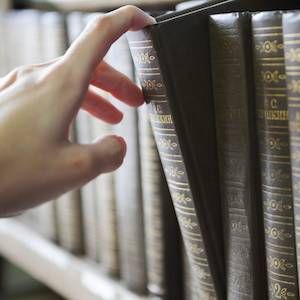
The Art of Reading Spines
While we at the Riot are taking this lovely summer week off to rest (translation: read by the pool/ocean/on our couches), we’re re-running some of our favorite posts of 2014. Enjoy this Best Of, and we’ll be back to your regularly scheduled programming on Monday, July 7th!
This post originally ran April 25th.
____________________
“We’re not a Costco. We’re not a Best Buy. We have something entirely different from them. We’re more than just a store, we represent something else and we have to be able to give them that.”
This is a paraphrase from an old manager of mine, a manager who used to run The Strand for many years, and was now a part of the team at my bookstore. It was a quiet afternoon, and we were discussing community and bonds and people, and how at the end of the day a bookstore can’t be just a store. It has to be more.
“People don’t just come in and get what they want. They look around, they take their time, they want to feel welcome and they want to find what they need.” And that stuck with me.
Bookstores (and this definitely goes for libraries as well), whether brick and mortar or online or through a device . . . they aren’t typical. It’s not like you walk in with a grocery list: I need three Classics, a paranormal romance, can I get a half container of magazines, and if you have any fresh Fantasy, I’ll take a look at that, too.
Browsing.
People browse. People search and hunt and dig into all the narrow veins of a bookstore or a library for what they need, even if they don’t know what they need yet.
And I think that’s the magic for readers: They are given the opportunity to choose their future. They get the chance to choose who they want to be for the brief moments they crack covers and dive into cream white pages, night sky print, held together by the binding of a spine supporting whole worlds.
Running hands along the shelves, fingers tracing the letters carved into the backs of books, they become an oracle. They get to not only glimpse their future but they get to choose it.
That’s an unprecedented and dangerous power. It’s what makes reading a force to be reckoned with. You get to decide whom you will be, whose shoes you will walk around in, and what kind of person you’ll be when you come back.
It’s part of the appeal for massive amounts of readers, this out of body experience, to escape from who the world is telling you to be. To have a chance to be a knight upon a dragon’s back, or a Queen ruling against a mass of conspirators, or a young boy or girl finding out what love is? How could someone refuse that?
Above all though, remember: you have to come back with what you’ve learned. Campbell tells us the tale isn’t over until the hero comes home changed, comes home as the person they needed to become all along.
Reading the spines, diving into worlds, learning with every heartbreak and shout of triumph, and climbing the stairs out of the underworld back into the light of the world: every book we read is helping us become who we need to be.
Bookstores and libraries, whether they be brick and mortar or online or on a device, serve an important purpose, never forget that. They establish community, they bring people together, but most of all, they give people the chance to learn, and grow, bit by bit.
We’re all of us oracles, and there is nothing like the rush of finding your future on the shelf.














